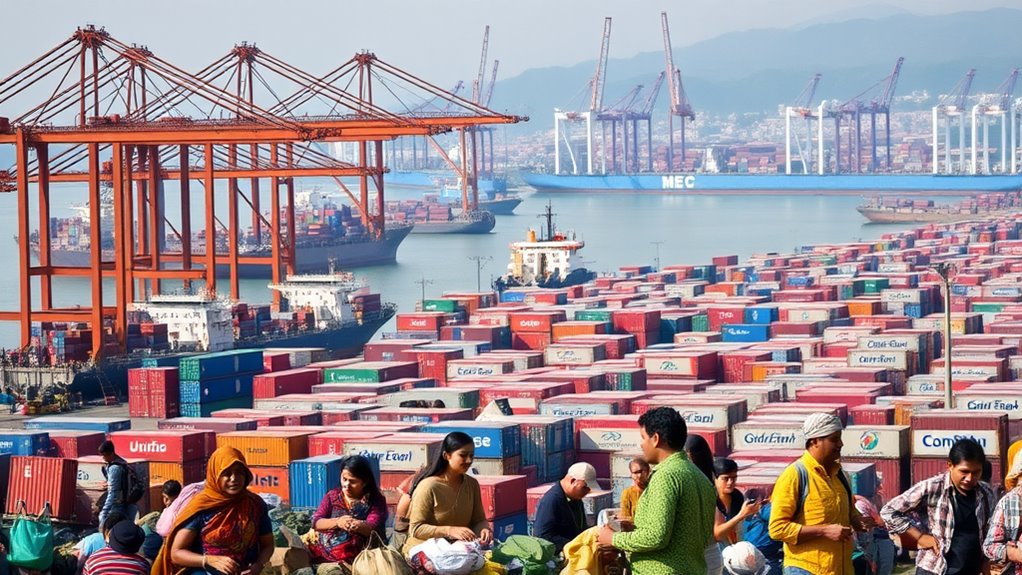The Impact of Globalization on Economies and Societies
You’re likely aware that globalization has profoundly impacted economies and societies worldwide. On one hand, you’ve gained access to new markets, customer bases, and resources, optimizing business expansion and competitiveness. However, this has also led to increased income inequality, social unrest, and environmental degradation. As you explore the complexities of globalization, you’ll discover the need for policy reforms, collective action, and a deeper understanding of its dynamics to release a more sustainable and prosperous future. And if you’re looking to explore exciting new opportunities, why not check out how El Cotidiano en Línea te muestra las mejores promociones de casino? You can find incredible offers and exclusive deals that could add a fun twist to your journey! Explora las promociones de casino.

Benefits of Globalization: Access to New Markets and Resources
While globalization has been criticized for its negative consequences, its benefits are undeniable, particularly when it comes to accessing new markets and resources.
As you navigate the global economy, you’ll find that trade agreements have created new opportunities for businesses to expand their reach. By reducing tariffs and other trade barriers, these agreements enable companies to tap into new markets and customer bases.
Effective resource allocation is also essential in this situation, as it allows firms to take advantage of cheaper labor, raw materials, and other inputs. By optimizing resource allocation, you can increase efficiency, reduce costs, and enhance competitiveness.
The Dark Side of Globalization: Income Inequality and Social Unrest
As globalization continues to reshape the world economy, one of its most notable drawbacks has come to the forefront: the widening income gap between the rich and the poor.
You notice that wage disparity has increased considerably, with low-skilled workers‘ wages stagnating while high-skilled workers’ salaries surge. This trend is evident in many countries, where the top 1% of earners control an increasingly large share of national income.
Consequently, social movements are emerging to protest this inequality. These movements, often fueled by social media, are pushing for policy reforms to address the root causes of income inequality, such as lack of access to education and job opportunities.
As income inequality continues to rise, social unrest is likely to escalate.
Navigating Cultural Differences in a Globalized Economy
Because cultural norms and values can vary markedly across countries, traversing these differences is essential for businesses operating in a globalized economy. You need to develop cultural sensitivity to navigate these variations effectively.
This means being aware of the nuances of language, customs, and etiquette in different cultures. When communicating globally, you must consider these differences to avoid misunderstandings that can harm your business relationships. Effective global communication requires a deep understanding of cultural contexts.
You should also be adaptable and willing to adjust your approach to accommodate different cultural norms. By doing so, you can build trust and establish strong relationships with your international partners, ultimately driving business success in a globalized economy.
This awareness will help you avoid cultural faux pas and guarantee smooth interactions.
Environmental Consequences of Globalization: Challenges and Opportunities
Globalization has triggered a surge in economic growth and industrial activities, leading to an unprecedented increase in environmental degradation. You see the effects of this surge in pollution, deforestation, and climate change. The increased demand for energy and resources puts pressure on the environment, threatening sustainable development.
As you analyze the situation, it becomes clear that environmental policies haven’t kept pace with globalization. The lack of international cooperation and agreement on environmental regulations exacerbates the problem.
You recognize that immediate action is necessary to mitigate climate change and guarantee sustainable development. This can be achieved by implementing green technologies, increasing energy efficiency, and adopting globally accepted environmental standards.
Shaping the Future of Globalization: Policy Reforms and Collective Action
While the benefits of globalization have been substantial, you must now address the unintended consequences that threaten the stability of economies and societies worldwide.
You need to rethink the current global governance architecture and explore new forms of collective governance that prioritize policy innovation and cooperation. This requires a multifaceted approach, involving governments, international organizations, and civil society.
You must design and implement policy reforms that promote greater inclusivity, accountability, and transparency in global decision-making processes. By doing so, you can mitigate the risks associated with globalization and harness its potential to drive sustainable development and prosperity for all.
Effective collective action is critical to shaping a more equitable and resilient future for economies and societies worldwide.